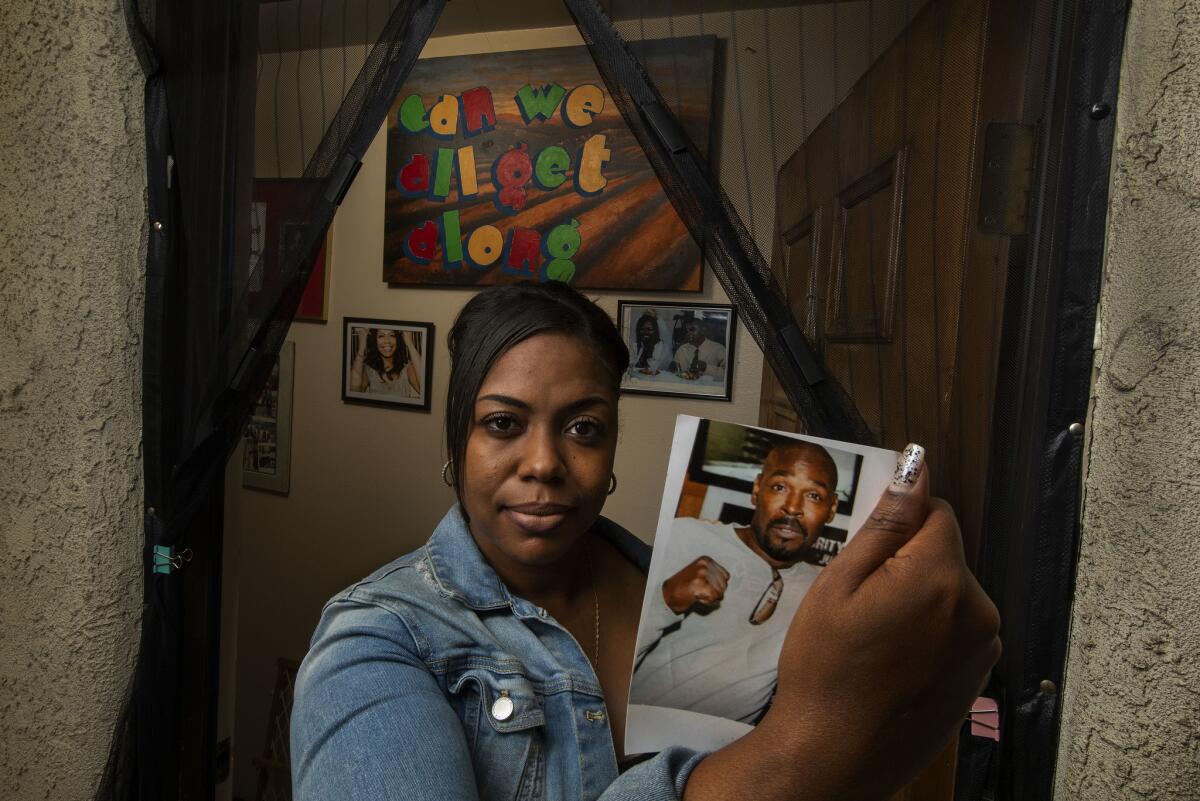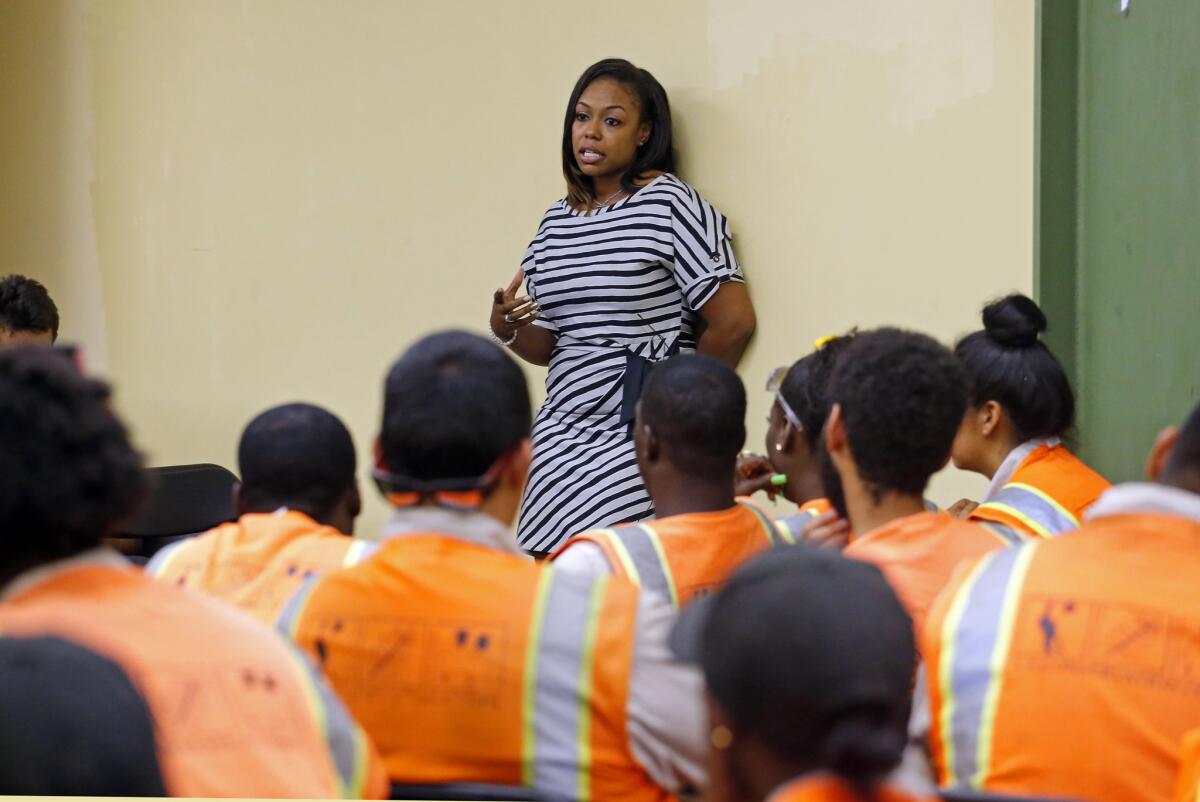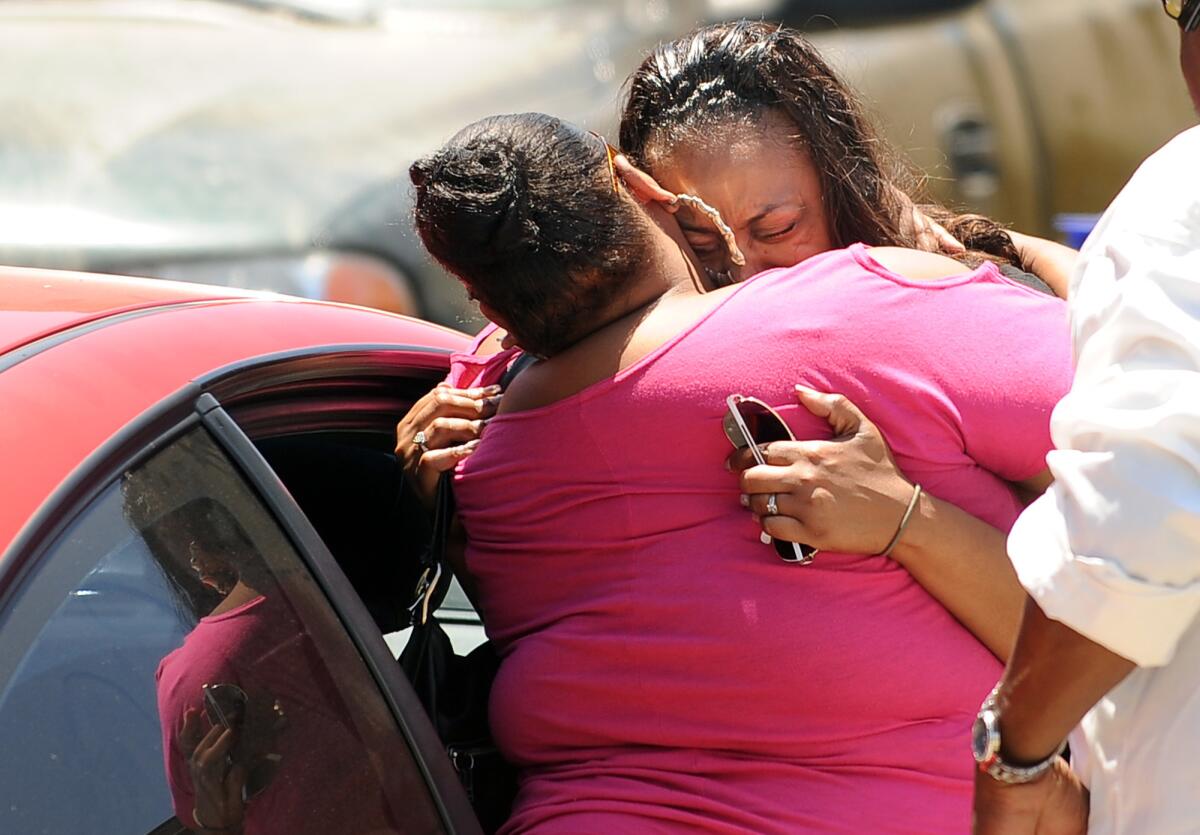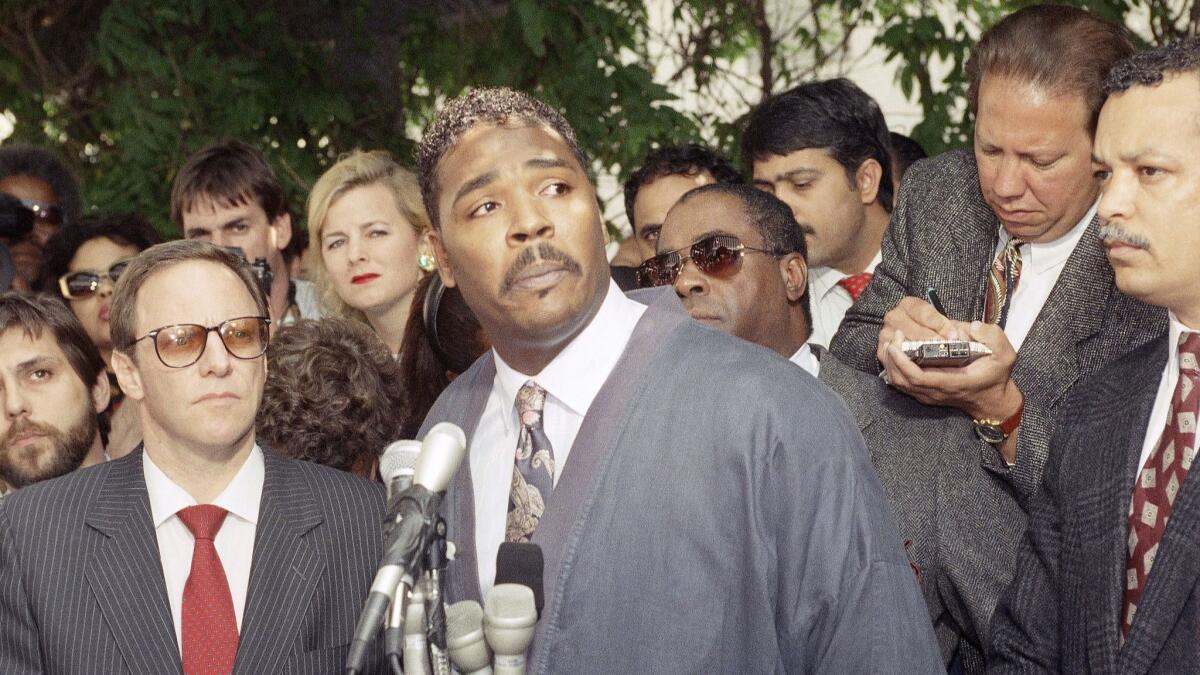Rodney King’s daughter fights to keep his memory alive

- Share via
His name once was synonymous with police brutality. Angry mobs shouted it as they torched buildings. And in some circles, the riots that erupted in the streets of Los Angeles in April 1992 bore his name.
The social upheaval and chaotic violence inspired by Rodney G. King — a black motorist whom LAPD officers bashed with batons and boots 56 times, a trauma that was captured on video and replayed across the world — became a defining moment in the history of Los Angeles, policing and race relations.
But for all the ways that King, who died in 2012, lives on in history and in pop culture, there’s no lasting testament in L.A.’s vast landscape that marks his memory.
“Some people saw Rodney King as a flawed martyr,” Kerman Maddox, a public affairs consultant who launched a recall effort against then-LAPD Chief Daryl Gates after the beating, wrote in an email. “Whether fair or not, his brushes with law enforcement before and after that brutal beating tainted his image and reputation with some folks.”
Now Lora King, his daughter, is working to change that. On Monday, the 27th anniversary of the start of the L.A. riots, she is launching the “I am a King” scholarship to celebrate black fathers.
PHOTOS: Rodney King | 1965 - 2012 »
Its mission is to provide financial support for black dads like her own so that they can play a more active role in their children’s lives. The scholarship, which would be issued periodically and range in value, would cover activity costs as small as dinner and a game of miniature golf, and as large as an all-expenses-paid trip to Disneyland. A prominent private tech entrepreneur has given $10,000 to establish the fund, and others have promised to contribute, said King, who also hopes to solicit donations from the public.
King, 35, hopes to remove the financial barriers that sometimes get in the way of paying for bond-building outings. Those were the type of obstacles removed from Rodney King’s life when the city awarded him $3.8 million in damages.
He used that money to expose his daughter to a life outside South L.A. They went skiing at Mt. Baldy, surfing in Venice and attended too many art exhibitions to count, she said. He poured resources into furthering her talents — paying for leadership camps and art programs.
He also devoted much of the remainder of his 47 years to preaching racial reconciliation and helping others struggling to break free of substance addiction, which he’d suffered as a consequence of his beating.
Yet there is no statue for Rodney King like the sculpture erected off Crenshaw Boulevard for civil rights activist Celes King III; no street intersection that carries his name like Crenshaw and Slauson Avenue will for slain rapper and entrepreneur Nipsey Hussle; no park or plaque like the downtown space dedicated to Biddy Mason, a former slave who became a wealthy landowner.
By giving to other children what her father gave her, Lora King hopes to keep her dad’s memory alive. “Who knows if they will ever acknowledge him in the way that they should,” she said. “He really didn’t care for that. He just cared about making a difference in people’s lives and creating change.”
::

Lora King said she’s now carrying the torch that her father struggled to bear.
She stood alongside prominent civil rights leaders at her father’s funeral to remind people to continue the fight for equality. Three years ago, she created an organization in his honor, the Rodney King Foundation for Social Justice and Human Rights. But she labored to get it off the ground as she juggled work and parenthood.
Still, she was able to use the foundation as a platform to meet with the Los Angeles Police Department, where she spoke with youngsters about de-escalating situations involving police. She also has spoken at Black History Month events and was the special guest at the Network of Korean-American Leaders gala last year.
Recently, she left her job as an administrative assistant at a law firm to head the foundation full time.
The scholarship is one of many initiatives to come that will cement her father’s legacy, she said. Some community activists agree.
“It’s going to make the kids look at their dads as hero,” said Edna De Leon, educational director of Red Eye Inc., which operates the Watts Empowerment Center, an organization Lora King asked to help her find the first award recipient.
De Leon said active single black dads are “not the narrative that we see most of the time.” King’s scholarship will counter that, she said.
To apply, black fathers will need to go to the foundation’s website and submit a picture and a short essay detailing their plans with the scholarship money. King hopes to distribute the first awards on Father’s Day — the day she lost her dad and the day she is expected to deliver her first son.
“I want to help build up what was burnt down,” she said.
::

Rodney King was a polarizing figure.
The unemployed construction worker was out on parole and had been drinking on the night of March 3, 1991, when officers pulled him over on Foothill Boulevard. He was acting erratically when he stepped out of the car. LAPD officers surrounded him, shot him with Tasers and struck him over and over again in the head and body with a 2-foot-long solid piece of aluminum. They stomped on him with the soles of their boots.
The whir of helicopters roused George Holliday from his sleep. He grabbed his video camera and pressed record.
The grainy footage exposed the mistreatment that black people had long suffered at the hands of police — decades before the era of Black Lives Matter, when victims of police violence became hashtags and cellphones captured viral videos of police shootings of unarmed black men.
The video jarred L.A. and the nation. Rodney King was instantly heralded as a latter-day civil rights icon. Critics of King saw him as a complex man who attracted trouble and did not find him worthy of the exalted status of a Rosa Parks or Malcolm X.
It was an unwanted celebrity that King grappled with, he would later say in interviews and in his book, “The Riot Within: My Journey from Rebellion to Redemption.”
“Rodney King was never comfortable with the role that history and the community wanted to assign him,” said community activist and King’s acquaintance Najee Ali, “that, just because he was beat by police, that he should’ve automatically been a criminal justice reform activist.”
Four policemen — Sgt. Stacey C. Koon and officers Timothy E. Wind, Laurence M. Powell and Theodore J. Briseno — faced trial for the beating. A jury with no black people on it acquitted all of them April 29, 1992. Angry demonstrators clustered on corners, set fire to entire blocks, looted stores and assaulted bystanders. Civic leaders pleaded for calm.

The third day of the riots, Rodney King made a passionate plea before television cameras: “Can we all get along?”
Over the years, his famous words have been twisted by pop culture and contorted into a punchline that he never said: “Can’t we all just get along?”
The six days of violence became known by different names depending on who you ask. To some, it was an uprising, a revolt, a rebellion or simply the “Rodney King riots.” By any name, they resulted in 54 deaths and nearly $1 billion in property damage. The next year, the four officers were tried in federal court on charges of violating King’s civil rights. Two were convicted and went to jail. Gates stepped down as LAPD chief.
In the generation that followed, the LAPD began to implement reforms recommended by the Christopher Commission that reverberate today throughout the department. The force is more diverse, there’s greater transparency and a different approach to policing, according to Times coverage, but much work remains to rebuild trust.
Years after King’s death, Police Chief Charlie Beck said, “His legacy should not be the struggles and troubles of his personal life, but the immensely positive change his existence wrought on this city and its Police Department.”
Today, much of that legacy is fading from memory. The riots are not required teaching in L.A. Unified classrooms, although some teachers incorporate King into their lesson plans. There will be no official public tribute to him on the anniversary of his death, or to the riots.
“He’s not fitting the image as someone you think of as a superhero,” said Earl Ofari Hutchinson, president of the Los Angeles Urban Policy Roundtable. “You couldn’t point — other than he got beat and the video — you couldn’t really name one thing he contributed to.”
Hutchinson said King’s legacy contrasts with that of Nipsey Hussle, born Ermias Asghedom. The rapper’s violent death last month made him a martyr fighting for his neighborhood, in the eyes of many. In turn, the community rallied to get the intersection where Hussle grew up, and owned and operated a business, named after him, and they spray-painted his face on buildings all around the city.
But Lora King said her father’s legacy now will live on — through her.
“As long as I continue to follow my vision, he will always be represented.”
More to Read
Sign up for Essential California
The most important California stories and recommendations in your inbox every morning.
You may occasionally receive promotional content from the Los Angeles Times.











